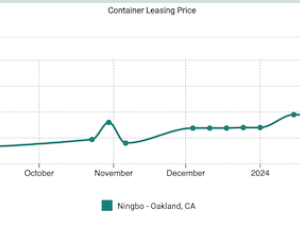Container shipping lines in the Westbound Transpacific Stabilization Agreement (WTSA) say they fully intend to follow the formula adopted in late 2008 for calculating bunker fuel charges, when those charges adjust on October 1, 2009.
On October 1, WTSA lines have scheduled increases of US$132 per 40-foot container (FEU) via the West Coast, and $258 per FEU via the East and Gulf Coasts, for dry cargo; and of $186 ad $342 per FEU, respectively, for refrigerated cargo. The increases reflect higher average bunker fuel prices during the 13-week calculation period of June through August. WTSA's bunker charge calculation formula tracks average bunker fuel loading prices at Hong Kong and Los Angeles for the West Coast, and Hong Kong and New York for the East and Gulf Coasts. It then translates fuel price fluctuations into per container fuel-related costs for a typical transpacific West Coast or East/Gulf Coast sailing.
'WTSA lines have come under pressure to mitigate their bunker charge adjustments after general rate increases taken in early September,' explained WTSA executive administrator Brian M. Conrad. 'The lines recognize this is an especially challenging market environment and that certain westbound commodities are highly price-sensitive. But it's important to keep in mind that the bunker charge addresses specific costs in carriers' operations that must be recovered; it is distinct from rates, follows a set formula and is not intended to be either increased or mitigated to offset movement in freight rates.'
Conrad noted that, during the 13-week June-August calculation period alone, transpacific bunker fuel prices to the US West Coast increased from $386 to $446 per metric ton. Bunker prices to the East and Gulf Coasts rose during that same period from $387 to $452.50. For purposes of year-to-date comparison, average transpacific bunker fuel prices at the beginning of 2009 were $274 to the West Coast and $237.50 to the East and Gulf Coasts, indicating a steep overall rise in carrier fuel costs during 2009.





